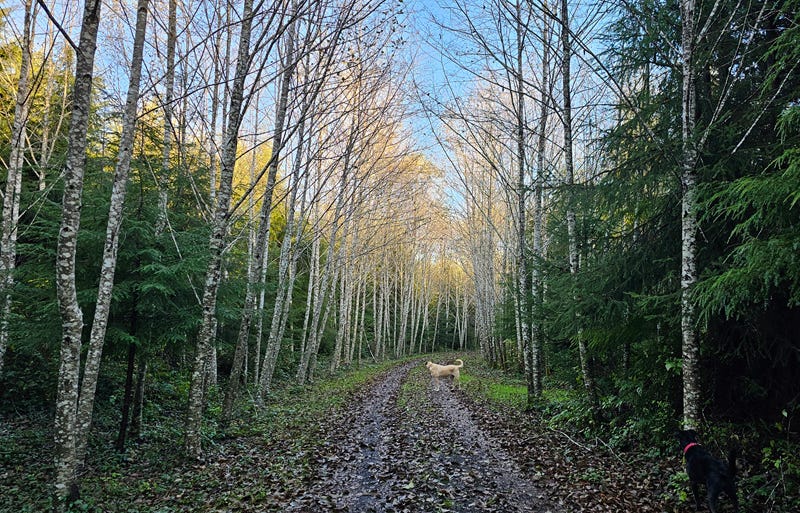How I Became a Tree Pusher
In the country, I’m learning new skills my suburban self would never have considered.
My 30-year-old self never would have believed it, but last weekend I became a tree-pusher. Not a tree-hugger. A tree pusher.
The plan was simple. I both need and want to learn to operate our tractor, and my husband needed to remove trees that leaned over the road, were damaged, or weren’t thriving. He wielded the chainsaw. I used the tractor’s forklifts to direct the tree fall and sometimes to give them an added push when they got caught on the way down by other trees.
So, there I was, creeping down the road, scanning the levers on this – to me – big orange beast, looking for the turtle/rabbit icon that would let me go beyond a slow walk. My cousins learned this when they were kids, so I guess I’m behind the curve.
Randy says he was hoping I would have fun and feel powerful like Sigourney Weaver’s character in the movie Aliens, when she clambered into an exoskeleton power loader and hurled away the monster with a wave of her arms.
Unlike Sigourney, I don’t yet feel powerful using the tractor… but I did find the rabbit icon and learn to raise, lower, and tilt the forks. That’s progress. Randy was patient with me, so I’d call it a good experience.
Building Capabilities
Learning new skills has become a part of our lives in the country. It’s what I hoped for when we left the suburbs, if truth be told. I wanted our children to grow into capable men…people with the skills to be reasonably self-sufficient when the need arose, and the willingness to tackle tasks they thought were a bit beyond them.
But, the kids and I never gravitated to farm equipment, so it remained Randy’s domain (for far too long, he’d say). One son dove into that world a couple years ago, in response to a neighbor’s call for help. I was proud of him. Our other son still doesn’t quite trust power tools. He’s happy to help with the manual labor, though, as long as whirling blades aren’t involved.
Farm chores are almost relaxing, in a Zen sort of way. Maybe that’s because there is a tangible accomplishment. Once the firewood is cut, the house is painted, the blackberry thickets are removed…whatever… the results are evident and that task doesn’t have to be repeated for a while…unlike vacuuming!
Learn Something New, Regularly
For years, even in the suburbs, my goal was to learn something new each year. In my 20s, those somethings included sailing, rock climbing, and scuba diving. In my 30s, it was how to care to infant twins and, as they grew, ways to share the wonder and science of the outdoors with them.
When we moved here, where the asphalt ends, learning new things centered around homebuilding. I’ve become pretty handy with a wet tile saw now (I’m still proud of myself…) and can lay tile and grout in a pinch. House painting, inside and out, is almost fun.
Last year, Randy and I (plus one of our two sons) began learning to garden in this cool, gray climate after years of failure.
We joined Master Gardeners for science-based gardening training, and to be volunteer gardening educations. We’re interns now, and I absolutely love it. We’ve learned a tremendous amount, have made good friends, and find we really enjoy working with people to help them improve their own results.
Skills building is a work in progress, but isn’t everything? I find repetition helps.
What are you learning this year?
Master Gardeners programs are run through state universities’ extension programs, and are available in most of the 50 U.S. states. Click for state Master Gardeners contact information.
FYI: In Washington state, applications for Washington State University’s Master Gardener training class of 2025 are available July 1 through August 30, and classes are scheduled to start October 1 and end February 21. Becoming a Master Gardener requires 180 hours of training, divided into weekly online learning from university horticulture experts, 20 hours of hands-on labs with certified Master Gardeners, and 40 hours of volunteer garden-related work (like plant clinics, and garden tours.). There are breaks for holidays.
Thanks for reading Where the Asphalt Ends! Subscriptions are FREE, delivered weekly to your inbox.






I so enjoyed this, Gail. Something about you sharing about your family really resonated with me and delighted me, bringing me joy. This blog was like a country western song and music to my soul! It addressed the three main themes included in most every country western song:
"...love and relationships, hard work and the working class, and rural life and the American landscape." (AI generated) (I'm thinking babies and tractors and a mother's love... maybe you have a long, black train story to tell someday 🤣)
I gained the great experience of using farm equipment and gaining life skills around mammals much larger than I when I spent summers in Kentucky with my farmer relatives. Your blog brought back cherished memories except for that stubborn old attack goat and a rooster that gave me PTSD. Diving under a bush at 5 years old didn't stop the ambush, but my screaming and my Mama did!